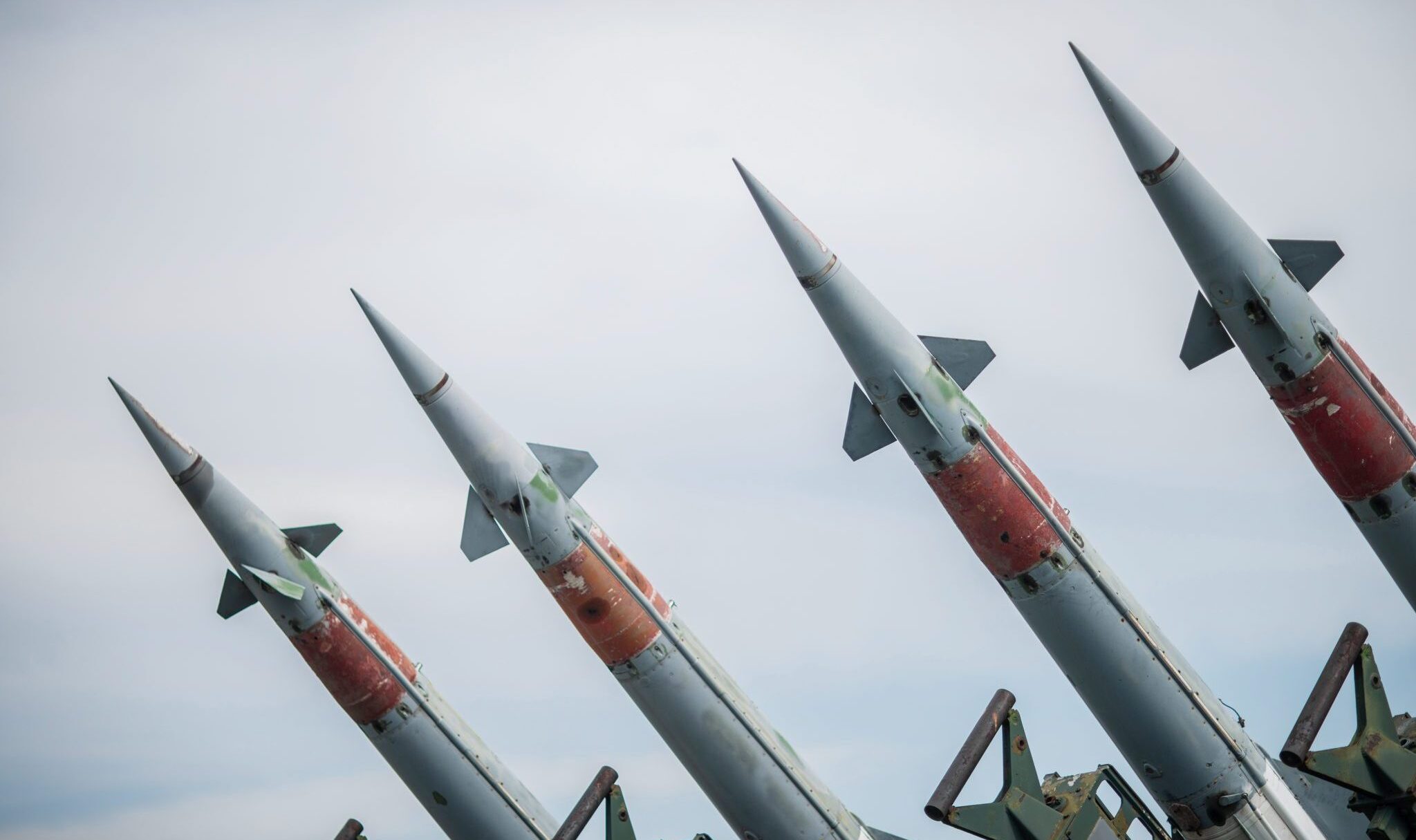Politics
The best defense for the United States is reducing the occasion for war.

The United States remains the world’s most secure nation. It is surrounded by broad oceans and peaceful neighbors. It possesses the world’s first- or second-largest economy, depending on the standard used. It is the world’s wealthiest country. If Americans stopped trying to micro-manage foreign affairs, they also would be the world’s safest people.
Britain’s and America’s spy chiefs, MI6 head Richard Moore and CIA Director Bill Burns, respectively, declared that “the international world order . . . is under threat in a way we haven’t seen since the Cold War,” but that is more because of than in spite of Washington’s conduct, particularly its reckless pursuit of global primacy. The U.S. faces the possibility of expanded conflict in the Middle East and great-power war in both Europe and Asia. Worse, the latter two could go nuclear, with the American homeland a potential target.
The Mideast is merely bad. The U.S. continues illegally to occupy Syria and to needlessly maintain garrisons in Jordan and Iraq with forces periodically attacked by Iranian- and Syrian-linked militias. Americans have died for nothing. Washington regularly retaliates, ensuring sporadic return fire. Last month the U.S. intervened in intra-Syrian combat between Kurdish fighters backed by Washington and forces allied with the Damascus government. The U.S. Navy or its allies are on seemingly permanent station defending Asian and European maritime commerce from Yemen’s Ansar Allah—its attacks triggered by Israel’s brutal destruction of Gaza, made possible by U.S.-supplied weapons.
The Biden administration has proposed turning the American military into a modern Janissary corps to act as a bodyguard for the Saudi royal family. Washington’s ongoing involvement in the burgeoning Israel–Iran conflict enables Jerusalem’s reckless attacks on Iran, triggering retaliatory strikes. Despite having already armed Israel for its defense, Washington deployed extra U.S. forces to the Middle East to act as Israeli factotums. Even more incendiary is the ongoing conflict between Israel and Lebanon’s Hezbollah, which constantly threatens to explode. Explained Moore: “We have navigated, touch wood again, past another crisis point between Israel and Iran. But as long as . . . we don’t get to a cease-fire, that risk is there. And for all the horror of Gaza, a wider conflagration in the Middle East would be vastly worse.” America would be deeply involved in such a conflict, which it has done so much to encourage.
Even more dangerous is the situation in Europe. Today the U.S. is enmeshed in a proxy war against a nuclear armed great power over Washington’s insistence that Europe up to Russia’s border be America’s sphere of influence. Historically, who controlled Kiev mattered little to Washington, but as memories of the Cold War faded the US and its European allies recklessly violated a cascade of assurances to Moscow and expanded NATO, ignoring a similar cascade of warnings from Russia. Today the U.S. is ever so slowly sliding towards open conflict over the issue. The U.S. and Europeans have filled Ukraine with arms, gradually reducing restrictions on their use. Allied troops are stationed in Ukraine, conducting intelligence and operating weapons. Moscow is striking back in Europe, conducting what Burns and Moore termed a “reckless campaign of sabotage.” Yet it was Ukraine which attacked Germany’s Nord Stream pipelines. Kyiv, backed by governments in Europe and legislators in America, continues to press Washington to enable attacks on Russia proper, something the U.S. would never accept if the roles were reversed.
Finally, there is Asia. U.S. policymakers believe an expanded Monroe Doctrine entitles them to pen the People’s Republic of China within its own borders. Taiwan is the most important flashpoint, with Washington’s broad consensus that the U.S. should go to war on Taipei’s behalf if the PRC uses force against the islands. However, while the territory matters little for the security of the U.S. homeland, Taiwan, less than 100 miles off China’s coast, is a vital, even existential interest to Beijing—consider the Kennedy administration’s willingness to risk nuclear Armageddon with the Soviet Union over Cuba. The issues involved are both security and historical, and on these questions the Chinese people are as hawkish as their leaders.
Moreover, recent clashes between Chinese and Filipino ships demonstrate that other territorial disputes also could lead to conflict. Although Washington does not formally recognize Manila’s claims, U.S. officials insist that America’s defense commitment to the Philippines covers every territory, ship, and person involved. The U.S. could have found itself at war with the PRC after the recent contretemps between the two nations’ naval vessels that left a Filipino sailor severely injured and the Philippine president insisting that even one death would “cross a red line.”
Any of these wars, even if conventional, would be serious. In Europe and Asia the conflicts could go nuclear. President Vladimir Putin has periodically warned of his government’s willingness to use nuclear weapons, and Moscow is updating its nuclear doctrine to make their use more likely. Richard Haass, former head of the Council on Foreign Relations, observed, “We are dealing with a Russia that is radicalized; the idea that nukes wouldn’t be used in a conventional conflict is no longer a safe assumption.”
Some Western analysts have dismissed Moscow as being a paper tiger since it has not escalated in response to multiple provocations. Yet, despite the war’s high cost, Russia is winning, recently making important advances in the Donbas. The Putin government probably has decided that there is no need to risk nuclear war. What if the conflict turned against Moscow, threatening Putin’s control? Burns explained that “there was a moment in the fall of 2022 when I think there was a genuine risk of . . . the potential use of tactical nuclear weapons.” He added, “None of us should take lightly the risks of escalation.”
One would think this would make Washington more cautious, but apparently not. Burns insisted: “I have never thought, however,…that we should be unnecessarily intimidated.” Moore agreed: “Nobody in the West is going to be intimidated by such talk or any other behavior by the Russian state.” Is Ukraine really worth the incineration of American cities?
Similar dangers lurk in the Asia-Pacific. The PRC continues to expand its conventional forces, especially its navy, which Washington cannot easily match. However, more frightening is China’s nuclear build-up. Although still well behind the U.S., Beijing may be seeking nuclear parity. Although neither country is likely to enter a fight intending to use nuclear weapons, never have two major conventional antagonists battled while possessing such armaments. World War II demonstrated that the force employed rises along with the stakes. In any fight over Taiwan the PRC would rely on scores of mainland military bases. The U.S. could not ignore their role, yet to attack them would mean striking the Chinese homeland—a serious escalation. That would push Beijing to retaliate, perhaps against American facilities on Guam, Okinawa, and Hawaii. There is no guarantee that a consequent retaliatory spiral would stop before America’s homeland.
In all these cases, the U.S. is risking nuclear war through “extended deterrence,” by which it plans to use nuclear weapons to defend allies from attack. The policy was established during the Cold War and persists largely through inertia. Nevertheless, Washington policymakers appear determined to double down. Apparently, the Biden administration has issued a new nuclear guidance to confront the possibility of a coordinated nuclear threat from China, North Korea, and Russia. Reported the New York Times in June, “A senior Biden administration official warned on Friday that ‘absent a change’ in nuclear strategy by China and Russia, the United States may be forced to expand its nuclear arsenal.” But none of these states can afford to back down, given Washington’s aggressive policy.
Nuclear disengagement would be a far better policy for the U.S. Extended deterrence worked during the Cold War. The Soviet Union showed no interest in conquering Western Europe, which was of only minimal security interest to Moscow, and which the US had twice intervened to defend. In Asia the PRC was convulsed internally and lacked the military capability for aggression against America’s security dependents. Explained columnist Francis P. Sempa, “In the 1950s, when the U.S. used nuclear threats to deter a Chinese invasion of Taiwan, China had no nuclear weapons and we had unquestionable strategic superiority over the Soviet Union.” Although North Korea seemed ready to renew the Korean War if feasible, it could not hit the U.S. proper. Essentially, Washington could threaten others with nuclear destruction without consequence.
This changed when the great powers believed that their vital interests were at risk. So it was during the Cuban Missile Crisis. Washington feared for the nation’s survival, and veered toward the brink. In 1983 it was the Soviet Union which worried about its future during the Able Archer exercise, when the possibility of war rose significantly.
Today, unfortunately, the U.S. and its allies increasingly threaten the core interests of contending great powers while lesser adversaries develop nuclear weapons. Thus, in Europe the U.S. and other NATO members are fighting a proxy war with Russia over what the latter views as a vital interest in Ukraine. Noted Dmitri Trenin, formerly with the Carnegie Endowment for International Peace, “The U.S. has now set itself the task—unthinkable during the Cold War—of trying to defeat another nuclear superpower in a strategically important region.”
Subscribe Today
Get daily emails in your inbox
In Asia the U.S. has threatened what China sees as “core” interests in nearby waters and is attempting to enlist its allies as part of an Asian cordon sanitaire against the PRC. When U.S. officials explain how their policy is intended to contain and restrain Chinese naval power, Beijing views maritime control as even more essential. North Korea is perpetually threatened by Washington but is now a nuclear power. Kim Jong-un already has called for an “exponential” increase in the North’s nuclear arsenal. Every time the U.S. flies its bombers over the peninsula or sends an “armada” off the peninsula’s shore, he likely adds a few more bombs to his plans. Some analysts fear that Pyongyang may go from scores to hundreds—while producing ICBMs capable of targeting the American homeland.
Full-scale conventional war would be terrible enough. Nuclear conflict would be truly horrific. In principle, China, North Korea, and Russia have no reason to attack the U.S. None have territorial disputes with America. None appear to have aggressive designs against America. Beijing and Moscow even have some shared interests with the U.S., while North Korea once appeared to see Washington as a useful counterweight to its two powerful neighbors. The nuclear danger to America is much increased by Washington’s willingness to risk the U.S. homeland to defend allies. How many countries now shelter beneath Washington’s “nuclear umbrella”? Certainly, NATO members, Japan, and South Korea. Probably Taiwan and Israel. Less clear are Australia and the Philippines. The Biden administration’s proposal to defend Saudi Arabia might add the latter to the list. Which of these states is truly important enough to invite nuclear devastation?
Instead of expanding America’s nuclear liabilities, the Biden administration and its successors should drop nonessential military commitments, especially to use nuclear weapons. America has important interests abroad, but few are worth risking national suicide. The U.S. must always be prepared to protect itself. Nevertheless, its most effective mode of defense today is avoiding unnecessary war. Washington should not sacrifice the very interest which it is supposed to safeguard, the American homeland.

